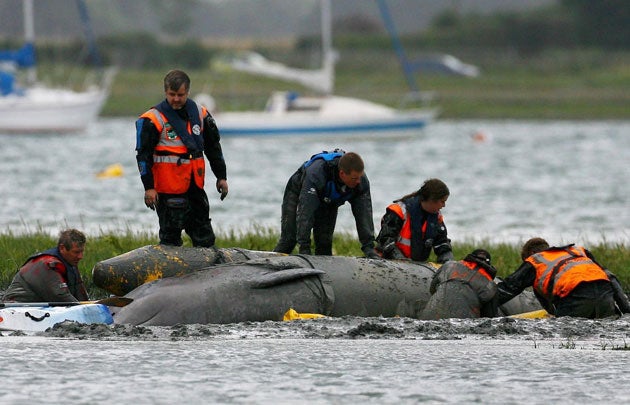Rescuers fail to save sick whale

Your support helps us to tell the story
From reproductive rights to climate change to Big Tech, The Independent is on the ground when the story is developing. Whether it's investigating the financials of Elon Musk's pro-Trump PAC or producing our latest documentary, 'The A Word', which shines a light on the American women fighting for reproductive rights, we know how important it is to parse out the facts from the messaging.
At such a critical moment in US history, we need reporters on the ground. Your donation allows us to keep sending journalists to speak to both sides of the story.
The Independent is trusted by Americans across the entire political spectrum. And unlike many other quality news outlets, we choose not to lock Americans out of our reporting and analysis with paywalls. We believe quality journalism should be available to everyone, paid for by those who can afford it.
Your support makes all the difference.A sick whale had to be put down last night after it repeatedly beached itself on sandbanks.
The northern bottlenose whale was stranded on harbour flats in Langstone, Hampshire, for around 12 hours in total.
Marine scientists had been about to put it down when it refloated in shallow water. But blood tests taken from the mammal were sent for testing and showed that it was suffering from irreversible renal failure.
Last night, the 26ft long whale became beached again on the East Winner sandbank, Hayling Island. Paul Jepson and Rob Deaville, vets from the Zoological Society of London, a vet from the British Divers Marine Life Rescue and a team of marine medics then worked together to administer a fast-acting, fatal dose of anaesthetic.
The six-tonne young adult had become dehydrated and hungry, and dangerous toxins had built up because its organs had been compressed under its body on the sandbanks near Langstone Mill. Faye Archell, the director of divers rescue team, said: "There's no coming back from renal failure."
About 50 people, including firefighters, marine biologists, Coastguard and RNLI staff had been involved in attempts to save the whale.
A northern bottlenose whale was stranded in the river Thames in London in January 2006. It later died.
Join our commenting forum
Join thought-provoking conversations, follow other Independent readers and see their replies
Comments